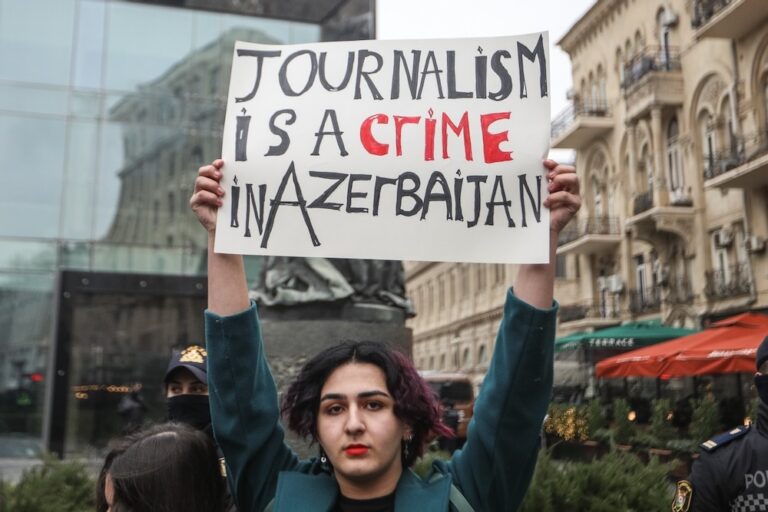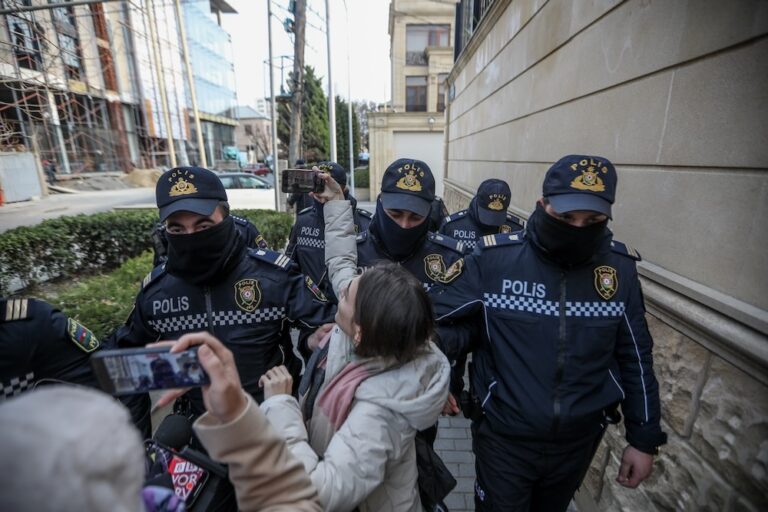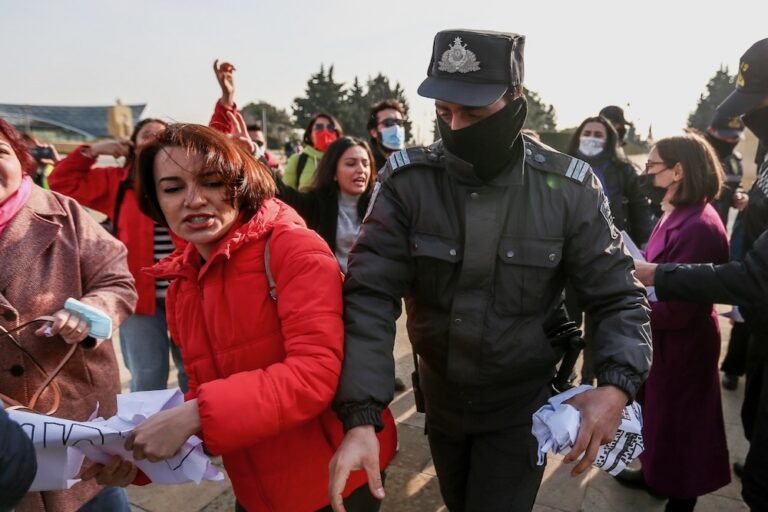IRFS wrote to the Council of Europe Parliamentary Assembly about the freedom of expression situation in Azerbaijan, which has deteriorated since the country became a member of the Council of Europe:
(IRFS/IFEX) – IRFS has written to the Parliamentary Assembly of the Council of Europe’s summer session participants about the freedom of expression situation in Azerbaijan, which has deteriorated since the country became a Council of Europe member:
19 June 2010
Dear Ladies and Gentlemen,
We wish to draw your attention to the freedom of speech and freedom of expression situation in Azerbaijan, which has deteriorated sharply in the past ten years since our country became a member of the Council of Europe.
The Azerbaijani government deprives independent TV and radio companies of their editorial independence through repressive policies. This is reflected in the results of the monitoring conducted on the country’s nationwide TV channels (2 state, 1 public and 5 private) that have been carried within the framework of the “Free Airwaves” Project, which is implemented with funding from the European Commission. According to the results, approximately 90 percent of TV broadcasting in our country is positive propaganda of the government (especially incumbent president Ilham Aliyev and his father, the late president, Heydar Aliyev). The remaining 10 percent is dedicated to neutral coverage of the government.
The results of the monitoring, which began more than a year ago, show that criticism of the government is never shown on Azeri TV channels; in fact, opposition and independent politicians are not given any coverage or airtime. Furthermore, the government refuses to fulfill its obligation to abolish the state TV channel (AZTV) and create a public TV channel in its place. Although the government created a public TV channel in August of 2005, the state TV channel continues to operate and is allocated twice as much funding from the state budget as the public channel.
In 2009, the government created a second state TV channel (Sport-Azerbaijan), and this TV channel also realizes the propaganda of the government. The licensing process for new TV and radio companies is carried out under strict supervision of the government and is not conducive to allowing independent TV channels and radios to obtain licenses. Additionally, at the end of 2008 the government banned three foreign radio stations – Radio Liberty, BBC and VOA from broadcasting via local FM frequencies. These stations were widely known as the only non-print media sources for objective local news.
The situation of print media is also not good. Major sectors of the economy in Azerbaijan are monopolized by commercial ventures that are closely associated with high-ranking officials. As a result, a normal advertisement market does not exist in this country, and this prevents independent and opposition print media from receiving advertisements.
Although the government claims that thousands of media publications have been registered in the country, research carried out by independent NGOs show that only about 20 newspapers are published on a daily basis and, out of those, only eight are popular among the Azeri population. In general, the circulation of independent and opposition newspapers does not exceed 25,000 – quite low for a country that has a population of nine million.
As a result of the murders and arrests of journalists over the last five years, several opposition media outlets have become concerned about the safety of their correspondents and self-censor articles on sensitive subjects that might provoke government ire.
The failure to prosecute people responsible for the murders of journalists and violence against reporters and the refusal to allow civil society to conduct alternative investigations shows that the present administration is not interested in solving these cases. To this day the government has not solved the 2005 murder of journalist Elmar Huseynov – an outspoken critic of the Azeri government. Instead, the government has arrested Elmar Huseynov’s colleague, editor-in-chief of “Gundelik Azerbaijan” and “Realny Azerbaijan” newspapers Eynulla Fatullayev. During a hearing on June 16, 2010 on Fatullayev’s case, the imprisoned journalist stated that his investigation into Elmar Huseynov’s case indicated that high-ranking officials from the National Security Ministry were likely involved in Huseynov’s murder. At present, there is serious concern about Fatullayev’s safety in prison. These concerns are well-founded – “Tolishi Sado” newspaper editor-in-chief Novruzali Mammadov died mysteriously in prison in 2009.
Although the European Court of Human Rights adopted a decision in April 2010 ordering the immediate release of Eynulla Fatullatev, the government refuses to release him. Instead Fatuallyev is facing spurious charges of narcotics possession, after special service organs planted narcotics on him in prison. If found guilty on these new trumped-up charges Fatuallyev could be held in prison for another three years.
The situation of freedom of speech on the internet is also worrisome. Internet Service Providers are monopolized by the government; this prevents competition, and affects internet prices and the quality of internet service. Furthermore, people are facing government retribution for critical remarks they make on the internet. The authors of a satirical skit about Azerbaijan’s government, Emin Abdullayev (Milli) and Adnan Hajizade, were provoked and then imprisoned. Although Abdullayev and Hajizade, like Eynulla Fatuallyev, have been recognized as prisoners of conscience, the government refuses to release them.
Another problem is the Azeri government’s failure to decriminalize defamation. Instead the government is seeking to expand legislation on internet regulation and institute licenses for the operation of online TV programs. Another reason for concern is the upcoming parliamentary elections, which will be held in Azerbaijan in November. As it is widely known, it is impossible to hold free and fair elections in a country where there is no freedom of speech and expression.
In addition to the aforementioned issues, there are countless other problems in Azerbaijan concerning freedom of speech and expression, however, it is impossible to list them all here. What we can say with certainty is that the situation of freedom of speech here worsens day by day.
Taking into consideration Azerbaijan’s commitments before the Council of Europe, we call on you to compel the Azeri government to:
– annul the 2 (two) state TV channels and create 2 (two) new public TV channels instead;
– create conditions for the existing public TV channel to operate independently;
– liberalize the licensing process for TV and radio companies
– permit foreign investors to join the process of creating TV and radio companies in Azerbaijan;
– liberalize legislative acts to create the necessary conditions for a balanced, professional media;
– find and prosecute everyone involved in the murders and beatings of journalists, and specifically find and prosecute the murderers of Elmar Huseynov and the organizers of his murder;
– end the persecution of journalists and immediately release Eynulla Fatullayev, Emin Abdullayev (Milli), and Adnan Hajizade;
– abandon plans to increase supervision and regulation of the internet.
Sincerely,
Emin Huseynov,
Chairman
Institute for Reporters’ Freedom and Safety


